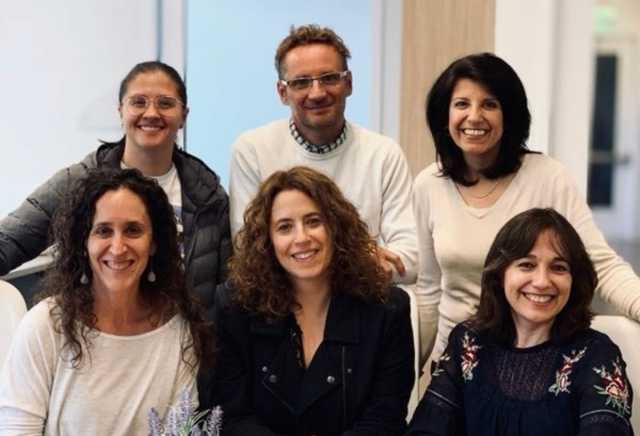Latin American Interdisciplinary Research Week Team Returns to the Center

This month, the 2017-2019 Interdisciplinary Research Week team came together again for their second weeklong residency at the USC Shoah Foundation Center for Advanced Genocide Research. With its annual Interdisciplinary Research Week opportunity, the Center supports the gathering of an international and interdisciplinary group of scholars working on a collaborative project grounded in the USC Shoah Foundation Archive. The 2017-2019 team first gathered at the Center in August 2017 to examine the experiences and narratives of Holocaust survivors in Argentina, Chile, Colombia and Mexico by using the testimonies housed in the Visual History Archive. To read more about that visit, click here.
This year, four members of the original team - Emmanuel Kahan (Universidad Nacional de La Plata, Argentina), Nancy Nicholls Lopeandía (Pontificia Universidad Católica de Chile, Chile), Daniela Gleizer Salzman (Universidad Nacional Autónoma de México, México), and Yael Siman (Iberoamericana University, México) – returned. In addition, Lorena Cardona Gonzalez (Universidad Nacional de La Plata, Argentina) and Sandra Gruner-Domic (Independent Scholar) joined the team this year for a week of joint discussion, research, and collaboration.
During their stay, the members of the team worked on refining the focus of their project and planning their next steps. They discussed and further developed their initial concentration on mobility, migration, and integration (with a special emphasis on memory) by identifying the themes within these categories that would be most fruitful for comparison. Some of these included the impact of family networks, national, social, political, and racial contexts, and state policies on Holocaust survivors’ experiences of and narratives about migration (to and from Latin America) and integration. In addition, they considered the impact of the survivors’ presence on host societies. The team’s goal is to compare these themes across Argentina, Bolivia, Chile, Colombia, and Mexico.
During the team’s presentation to the USC Shoah Foundation staff at the end of the week, the topic of the impact of national, social, political and racial contexts on the survivors’ experiences of their host societies and the manner in which they responded to these contexts emerged as a major avenue for comparison. Lorena Cardona Gonzalez explored the effect of the “La Violencia” period in Colombia from 1948 to 1958 on the lives and families of the Holocaust survivors living in the country. Nancy Nicholls Lopeandía examined how the memory of the Holocaust affected survivors’ decisions about migration during the political turmoil in Chile. Similarly, Emmanuel Kahan investigated the influence of the survivors’ experience of the Holocaust on their perception and interpretation of political events in Argentina, and discovered how they drew comparisons between Peronism and Nazism, which prompted survivors’ protests against the dictatorship in Argentina in 1967. Sandra Gruner-Domic explored survivors’ perceptions of their host societies and their own experiences of racial discrimination, as reflected in the testimonies.
Finally, Daniela Gleizer Salzman and Yael Siman focused on different factors that affected survivors’ experiences of migration to Mexico. For example, Siman discovered that, together with international and local aid agencies, family networks were crucial for the success of survivors’ migration to Latin America. However, Daniela Gleizer Salzman found that migrants also experienced many obstacles due to state policies around migration, especially when it comes to obtaining visas and legal status in the host country.
Following their visit to the Center, the 2017-2019 Interdisciplinary Research Week team presented their work at the international conference “In Global Transit: Forced Migration of Jews and other Refugees (1940s-1960s)”, which took place at the University of California, Berkeley, and was co-organized by the Center. The team’s future plans include publishing a collection of articles about their findings in a special journal and ultimately writing a book.